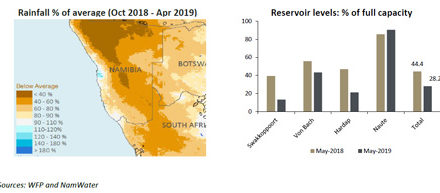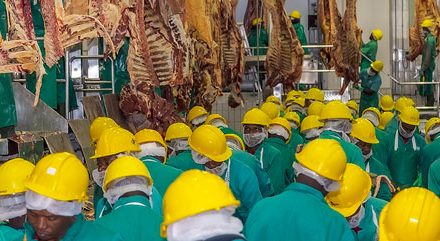
Road Map for the alliance on climate-smart agriculture

From the left, Dr Tobias Takavarasha, representative of South Africa, FAO; Dr Shadeck Moephuli, the CEO of the Agricultural Research Council, Patrick Verkooijen from the World Bank; Dr Xiangjun Yao, the Director of Climate, Energy and Tenure Division, FAO, Rome.
This conference discussed the latest research and policy developments to improve agriculture in Africa, and to develop strategies to leverage agriculture as a tool for small farmers to contribute to national food security. It underscores efforts in Namibia to teach small farmers in communal areas how to apply concepts such as conservation tillage, crop rotation, surplus production, and marketing strategies.
However, most importantly, the Conference marked the transition to the development of an Alliance on Climate-Smart Agriculture (CSA) which requires farming practices that are environmentally friendly.
“The objective is to formally launch the CSA Alliance during the UN General’s Leaders’ Summit on 23 September 2014 in New York,” said Dr Shadrack Moephuli, CEO of the Agricultural Research Council.
The CSA Alliance is the culmination of three interrelated processes namely the building of the partnerships which are planning to be development with five regional consultative meetings before and after FAO regional meetings scheduled from February to May 2014.
The proceedings of the CSA Alliance will be guided by a charter of which the initial draft of the indicated elements will be prepared with the support of the interim secretariat as input to the five regional consultative meetings involving all stakeholders.
Development of work programme, identification of prioritise and early action to be developed through action group meetings which will be held virtually and face to face.
“Today we established three action groups namely investment, knowledge and enabling the environment to develop a work programmes which identify priorities and early action in support of the CSA Alliance,” said Dr Moephuli.
The objectives of the Alliance is to accelerate the development and implementation across a range variety of agricultural systems and scales.
The Alliance is based on the following three pillars – Being sustainability of agricultural productivity; Adapting and building resilience to climate change; and Mitigating greenhouse gas emissions.
“The Alliance is intended to be open, inclusive and voluntary. We will also build on existing and ongoing work whilst focusing on concrete actions on the ground and not forgetting to promote collaboration, knowledge and information sharing,” concluded Dr Moephuli.













































